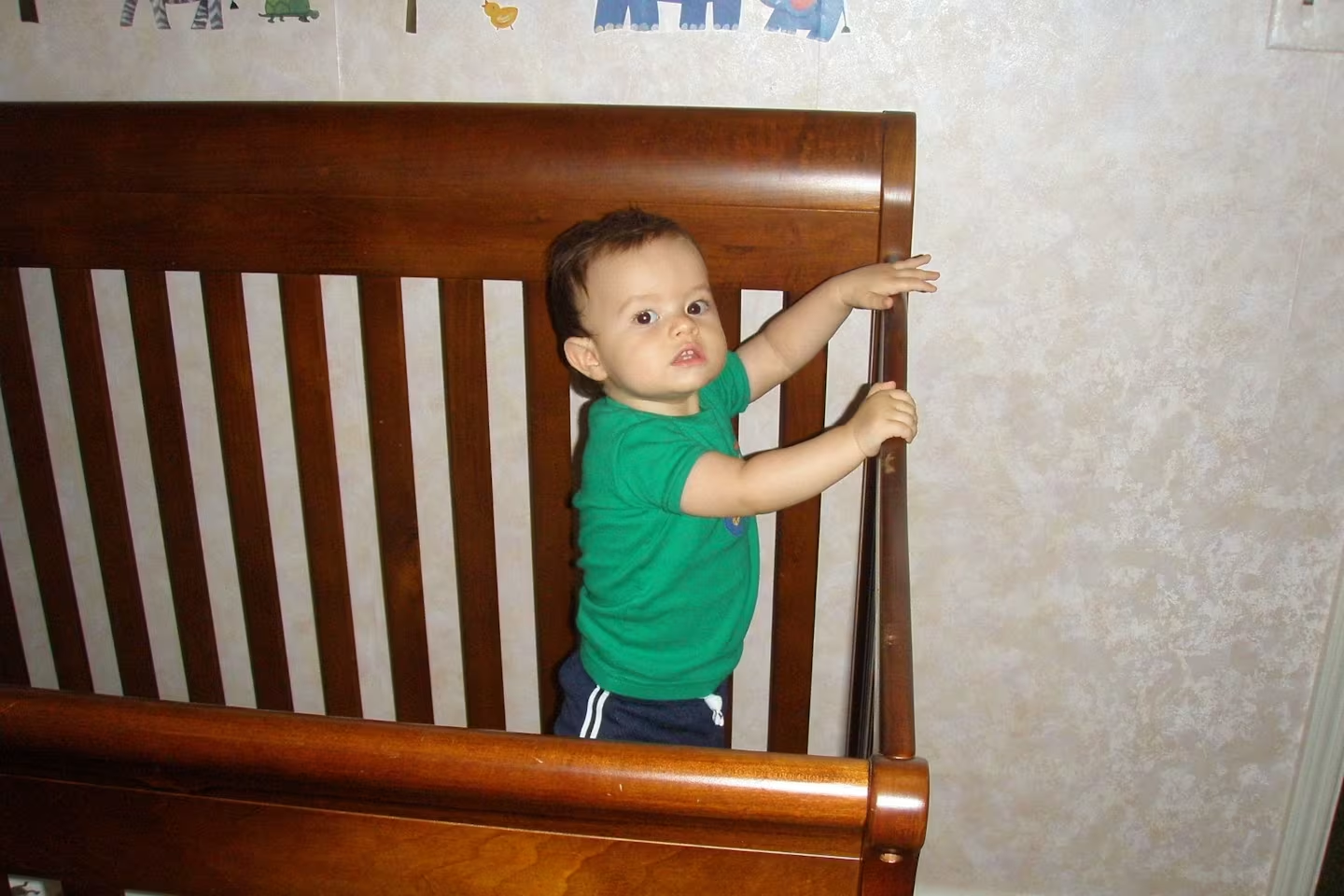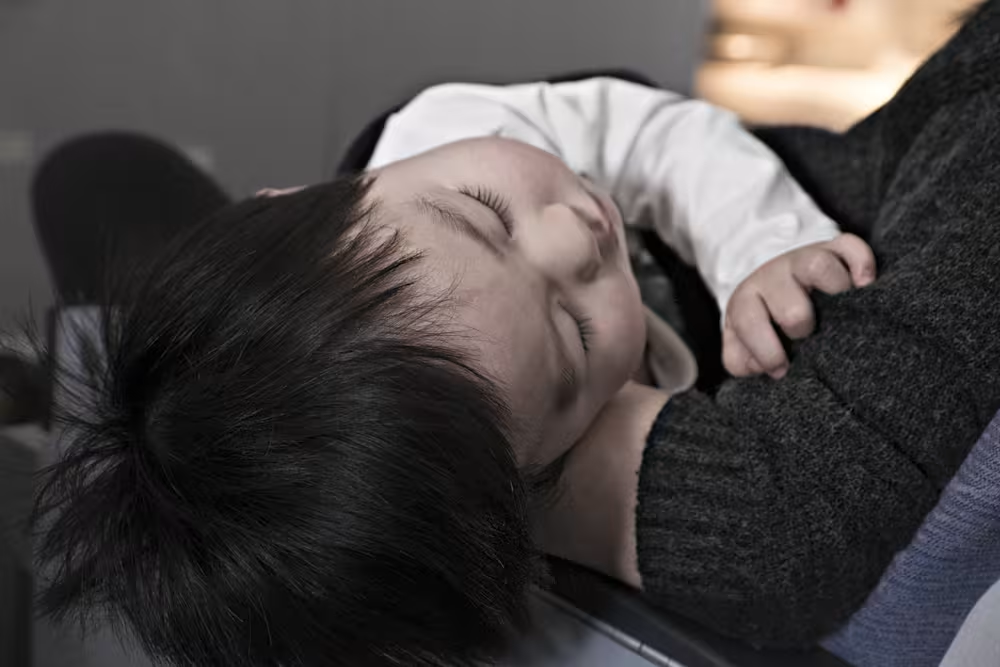How sleep training gave me my life back
Updated Dec 09, 2025

Given that I have over a decade of pediatric sleep consulting under my belt, you might assume that I’ve always been a proponent of . But you’d be wrong.
With my first child, my family suffered from fragmented, insufficient sleep for months because I worried that sleep training would have negative effects.
If I knew then what I know now, that first year of parenthood could have been a lot more joyful.
The 4 month regression hit hard
Like many parents, I want my children to be emotionally and physically healthy. To that end, I seek to make science-backed choices that support my goals and their development.
Easier said than done.
There’s so much conflicting information and advice out there! As a first-time mom, I felt a lot of internalized pressure to make the “right” choices when it came to my infant — but it was hard to figure out which choices were the right ones.
Around 4 months old, my son suddenly went from a champion sleeper to waking all night long. I suspected an ear infection, so I brought him to our pediatrician.
I didn’t realize it at the time, but the frequent night waking was actually a result of his parent-led sleep association (we fed him to sleep at bedtime) and the .
After ruling out discomfort as a contributing cause of the waking, our doctor told me what I needed to do: close the door at bedtime and don’t return until 12 hours later. I left feeling shaken by this directive to ignore my baby’s cries, which went against all of my gut instincts.
Cry it out was not a good fit
The advice to use “” to break my child’s sleep associations was way outside of my comfort zone. My baby was still feeding at night, and I’d made a habit of immediately responding to his cues and signals. It didn’t seem right to make such a sudden and drastic change to his routines.
On the other hand, I knew I needed help. Sustained sleep deprivation can impact so many aspects of one’s well-being, and I couldn’t be the parent (wife/friend/human) I wanted to be without sufficient sleep. My little guy wasn’t getting the rest he needed, either.
Feeling desperate, my husband and I decided to give cry it out a try. We attempted to leave our baby to cry when he woke up during the night. I didn’t last 5 minutes before I felt I needed to rescue him. Those 5 minutes felt like an eternity. I decided to look into other options.
Gentle methods didn’t work on my persistent baby
In an effort to solve our sleep problems, I read book after book on ways to improve sleep using gentle methods. Some nights would be better than others, but we couldn’t make any long-lasting, significant progress. I had a family member tell me that if I didn’t solve the problem by 8 months old, my kid would still be sleeping with me at 8 years old!
My son has a persistent temperament and didn’t want to change our sleep habits. So I would always fall back on doing whatever I needed to in order to make sure he got the sleep he needed, even if it was at my expense. The lack of sleep wasn’t sustainable; he was a happy baby, but I was not a happy mama.

As my son got closer to his first birthday, we still hadn’t made real progress on gradually moving away from the parent-led sleep associations that were the main cause of his frequent night waking. We continued to use movement or feed him to sleep, which meant he expected help falling back to sleep when he fully woke between sleep cycles. I was at my wit’s end with the fragmented sleep.
How I finally solved our sleep issues
In desperation, I turned to the . Unlike traditional “cry it out” (aka extinction), this progressive waiting approach allowed for regular check-ins, so I could reassure my baby in intervals. Although I knew it would be hard to get through, I also knew my son wasn’t going to magically start sleeping well without intervention.
Due to my baby’s temperament, age, and sleep habits, there was a lot of crying. Hours of crying. The first few nights there was so much crying that my upstairs neighbor chastised me for not responding to my child at night. But those difficult nights allowed us to finally make the progress we needed. My son finally learned to fall asleep on his own, which allowed him to consolidate and lengthen his night sleep.
What I had wrong about sleep training
Although it ultimately worked out, I now understand that sleep training didn’t need to be that hard. Here’s what I eventually learned:
There are different kinds of sleep training
At the time, I thought sleep training meant you left the room while your child cried themselves to sleep. Yes, that’s one way of doing it. But there are quite a few other, more gradual methods of too.
A solid foundation cuts down on crying
Establishing a strong foundation, like following an age-appropriate , and consistent bedtime routine can make a big impact on the sleep training process. Giving your baby opportunities to learn to fall asleep unassisted (before expecting it) can make it easier to avoid an ingrained helped-to-sleep habit.
Self-soothing is a skill that requires consistency
Like mastering any skill in life, progress will take practice. The more consistently you practice, the faster you’ll make progress. Temporarily returning to old falling asleep habits (or creating new ones) during times of travel or sickness can set back progress. But that doesn’t mean that sleep training “doesn’t work.” Falling asleep independently is a habit that requires consistency.
It’s OK to ignore well-intentioned advice
If I had followed through with using the extinction method for my 4 month old son, there likely would have been hours of crying every night for a week or longer. Expectations need to match the child’s developmental stage. Sleep training too early can lead to a lot of tears and discouragement. On the other hand, there’s no cut-off age for improving sleep. My son didn’t learn to sleep on his own by 8 months, but he did eventually learn healthy sleep habits.
Temperament plays a big role in sleep
It can be tough when all of the babies you know are sleeping well — except yours. Or you hear someone say, “Sleep training was easy! He cried once for 10 minutes and has been falling asleep on his own ever since!”
It doesn’t mean that you're doing anything wrong, and you’re certainly not alone. It may just be that your current sleep routines or sleep training method is not a good fit for your individual child.
You don’t have to sleep train all at once
When I desperately turned to the Ferber method, I used it for the entire night starting on day 1. As I mentioned, this led to hours of crying throughout the night. Starting with changing our sleep routines at bedtime only would have made the progress more manageable, and a better way for my family to start.
There’s no one-size-fits-all approach to sleep. While sometimes you need to go outside your comfort zone to make progress, never do something that feels wrong. Relying on advice from sources you trust can save you a lot of time, sanity, and sleep.
How I handled sleep the second time around
By the time my second child was born, I had the benefit of many years of sleep training and sleep consulting experience. This gave me the confidence to know that I could trust my instincts when it came to deciding what my daughter was ready for when it came to sleep.
Like her brother, she was fed or rocked to sleep as a newborn. But I also gave her the space to practice independent sleeping skills on her own, when the opportunities arose (i.e., when she had a full tummy, dry diaper, and was sleepy).
When her naps shortened at 5 months, I knew it was time to be more consistent in helping her learn to fall asleep on her own. I started sleep training at nap time only, and gradually transitioned from feeding to sleep to patting to sleep in the crib. From there, I was able to wean from the patting, and eventually, I could leave the room before she fell asleep. I felt human during that first year of her life — rather than like a sleep-deprived zombie.
Takeaway
Once sleep — or lack thereof! — no longer dominated my life, I realized two things. First, no parent should have to struggle for as long as I did because they lack the knowledge or support necessary to make positive changes. Second, I wanted to directly help as many parents as possible. This changed my career trajectory, and I transitioned from attorney to sleep consultant.
Share article:
Note: The content on this site is for informational purposes only and should not replace medical advice from your doctor, pediatrician, or medical professional. If you have questions or concerns, you should contact a medical professional.
Share article:






